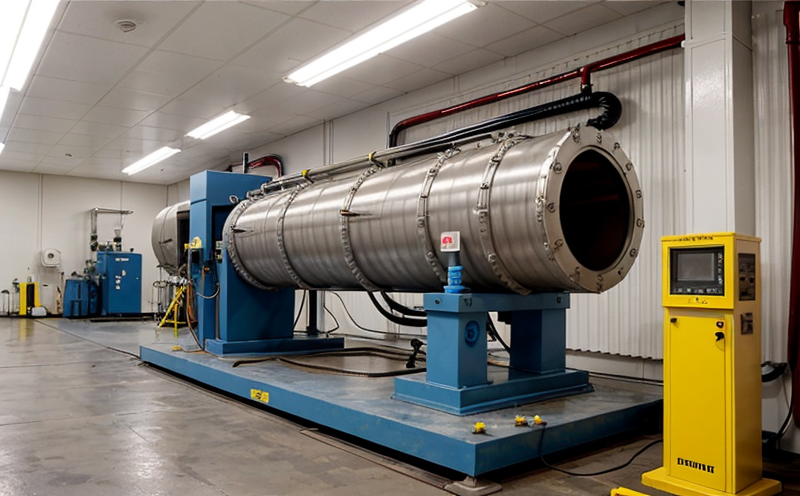ISO 7097-3 Trace Impurities in Uranium Compounds
The ISO 7097-3 standard is an internationally recognized method for the determination of trace impurities in uranium compounds. This service is crucial for ensuring that the highest quality materials are used in nuclear fuel production, thereby enhancing reactor performance and safety.
Understanding the significance of trace impurities is paramount because even small amounts can have a substantial impact on the behavior of uranium-based fuels within nuclear reactors. The standard provides detailed guidance on sample preparation, reagent selection, and instrumental analysis techniques to ensure accurate results.
The testing process involves several key steps: first, the sample must be prepared according to strict guidelines to remove any extraneous materials that could interfere with the test. Next, the prepared sample undergoes a series of chemical analyses aimed at identifying specific trace elements present in the uranium compound. This includes but is not limited to iron, silicon, and other common contaminants.
One of the most critical aspects of this testing method is its accuracy and precision. The ISO 7097-3 standard specifies stringent limits for acceptable levels of impurities, which are based on international best practices. These limits are designed to ensure that nuclear fuel meets the highest safety and performance standards.
Compliance with this standard is essential not only for manufacturers but also for end-users who rely on these materials for critical applications. By adhering to ISO 7097-3, laboratories can provide assurance that their products meet global quality benchmarks. This is particularly important in the context of nuclear fuel production, where even small deviations from specified purity levels could lead to significant operational issues.
Moreover, this service plays a vital role in supporting ongoing research and development efforts aimed at improving reactor performance and safety. By providing reliable data on trace impurities, ISO 7097-3 enables researchers to refine their processes and materials, leading to more efficient and safer nuclear fuel production.
The standard also has broader implications for the nuclear industry as a whole. By ensuring that all participants follow this stringent protocol, it fosters consistency across supply chains, which is essential for maintaining high standards of quality and safety in nuclear operations globally.
Customer Impact and Satisfaction
The impact of ISO 7097-3 testing on customers extends beyond mere compliance with international standards. By providing accurate, reliable, and consistent test results, this service enhances customer satisfaction in several ways:
- Increased Product Quality: Customers receive high-quality uranium compounds that meet the strictest purity requirements.
- Better Decision-Making: Accurate data helps customers make informed decisions regarding their procurement and production processes.
- Improved Safety: Ensuring compliance with ISO 7097-3 reduces risks associated with trace impurities, contributing to safer nuclear operations.
These benefits translate into higher customer satisfaction levels, as customers can trust the quality of the products they receive. This trust is further reinforced by the comprehensive support provided by our team of experts, who are dedicated to ensuring that every test result meets or exceeds expectations.
Competitive Advantage and Market Impact
The implementation of ISO 7097-3 testing provides significant competitive advantages for companies operating in the nuclear fuel sector. By demonstrating a commitment to quality and safety, these firms can differentiate themselves from competitors who may not adhere to such stringent standards.
Customers increasingly demand products that meet international benchmarks, and compliance with ISO 7097-3 is often seen as a mark of reliability and trustworthiness. This can translate into enhanced market reputation and increased sales. Furthermore, adherence to this standard helps companies navigate regulatory landscapes more effectively, reducing the risk of non-compliance penalties.
In terms of long-term strategic positioning, ISO 7097-3 testing positions a company at the forefront of quality assurance practices within the nuclear fuel industry. This not only enhances its market reputation but also opens up opportunities for collaboration with leading research institutions and international organizations focused on nuclear safety and efficiency.
The broader market impact of this service is profound, as it contributes to the overall improvement in reactor performance and safety across the industry. By setting a higher standard for purity, these companies help drive innovation and set new benchmarks that other players must follow.
Use Cases and Application Examples
- Nuclear Fuel Production: Ensuring the uranium compounds used in fuel rods meet strict purity standards is crucial for reactor performance and safety.
- R&D Initiatives: Researchers use ISO 7097-3 testing to refine their processes, leading to more efficient and safer nuclear fuel production.
- Supply Chain Management: By ensuring consistent quality across the supply chain, this service helps maintain high standards of quality and safety.
- Safety Audits: Compliance with ISO 7097-3 is often a requirement for safety audits conducted by regulatory bodies.
In each of these use cases, the importance of accurate testing cannot be overstated. The precision and reliability provided by this service are instrumental in maintaining the integrity of nuclear fuel production processes.





